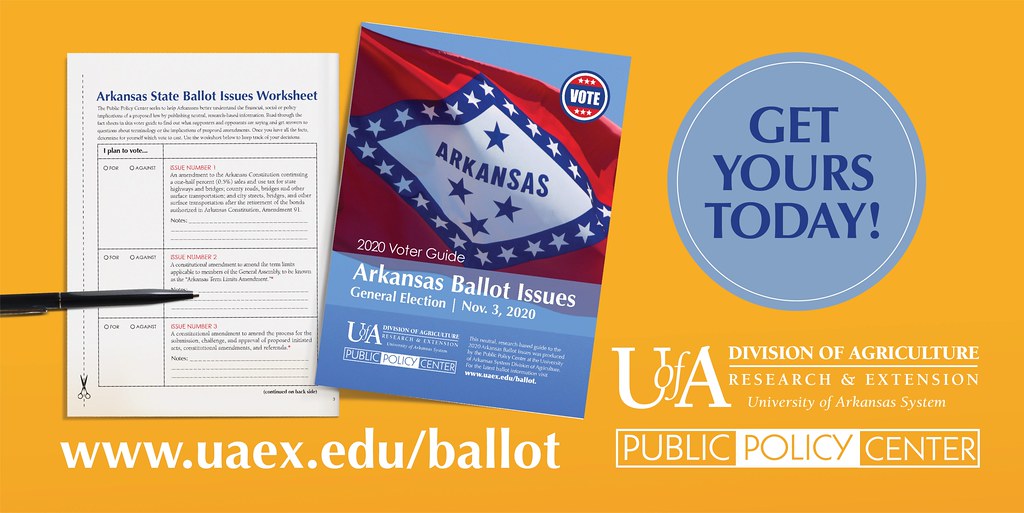Sept. 18, 2020
Cooperative Extension Service offers 2020 Arkansas Ballot Issue Voter Guide
By the U of A System Division of Agriculture
Fast Facts:
- Arkansans have 10 minutes to cast their vote on Election Day
- Three of six issues have been stricken from the ballot
- Issues 1, 2 and 3 remain
- Access voter guide online at uaex.uada.edu/ballot
- Print version available at county extension offices by first week in October
(670 words)
(Newsrooms: With art available at https://flic.kr/p/2jHxZzz)
LITTLE ROCK — Arkansans planning to exercise their voting rights during the upcoming November elections now have an invaluable education tool at their disposal: an online guide to Arkansas’ statewide ballot issues.
The 2020 Arkansas Ballot Issue Voter Guide, published by the University of Arkansas System Division of Agriculture’s Public Policy Center, is now available at www.uaex.uada.edu/ballot. The Public Policy Center is also part of the Cooperative Extension Service, the arm of the Division of Agriculture dedicated to public outreach and education.
Although Election Day is more than a month away, many Arkansans have requested absentee ballots this year because of health concerns tied to the COVID-19 pandemic. Arkansas Governor Asa Hutchinson signed an executive order in August allowing Arkansas voters to use absentee ballots if they had such health concerns.
County clerks began mailing out absentee ballots today. Early voting begins Oct. 19 and Election Day is Nov. 3.
Kristin Higgins, a program associate with the Public Policy Center, said the center has published unbiased fact sheets on statewide ballot issues since 2004 in an effort to help voters better understand what is being asked of them.
“Arkansas voters have some decisions to make this fall when it comes to the state constitution,” Higgins said. “But in 2020 fashion, the status of several ballot issues remains uncertain.
“Various court challenges may impact what voters see on Election Day,” she said. “But we urge voters to research the issues so they are prepared either way.”
Higgins said the printed publication, which should be available at Cooperative Extension offices in counties throughout Arkansas no later than the first week of October, will cover six statewide ballot issues, although the Arkansas Supreme Court has recently ruled that three of the six do not qualify to be on the November ballot. Issue 1, Issue 2 and Issue 3 remain on the ballot.
The online guide has been updated to reflect those court decisions, Higgins said.
This year, proposals include five constitutional amendments and a referendum. These issues are:
- A permanent 0.5% state sales tax for state, county and city roads, bridges and other surface transportation (Issue 1)
- Changing General Assembly term limits and allowing re-election upon a break in service (Issue 2)
- Changing Arkansas’ citizen initiative process, votes required for legislative proposals, and publication requirements for legislative proposals (Issue 3)
- The Arkansas Citizens’ Redistricting Commission Amendment (Issue 4) (Struck.)
- Changing the state’s primary system for statewide and congressional offices to allow for a single ballot primary, with the top four candidates advancing to the general election for ranked choice voting and instant runoff if necessary (Issue 5) (Struck.)
- A referendum on Act 579, a state law legislators passed in 2019 that amended the definition of “Practice of Optometry” (Issue 6) (Struck.)
Issue 1 is the only proposed constitutional amendment not being challenged in court. It was referred to voters by the General Assembly. Opponents are challenging the legislature’s Issue 2 and Issue 3 in Pulaski County Circuit Court over the wording of ballot titles.
All three citizen-initiated proposals – Issues 4, 5 and 6 – are also in court. The Arkansas Supreme Court recently ruled that those three issues did not qualify for the ballot because of problems with certifying canvasser background checks.
Understanding the issues
Arkansans see the popular name and ballot title of each proposed constitutional amendment when casting their votes. Every amendment actually includes more information than what is included on the ballot. Voters can find the full proposals and learn more about what they would do in the voter guide.
The voter guide includes:
- How the proposals will appear on the ballot
- What a “FOR” or “AGAINST” vote means
- Questions and answers about what proposals would do
- Supporter and opponent viewpoints
The voter guide is reviewed by University of Arkansas law school professors as well as issue supporters and opponents before publication.
Follow the Public Policy Center on Facebook or Twitter for up-to-date information on the ballot issues, or sign up to receive the center’s ballot issue education newsletter by emailing publicpoilcycenter@uada.edu.
To learn more about extension programs in Arkansas, contact your local Cooperative Extension Service agent or visit www.uaex.uada.edu. Follow us on Twitter at @UAEX_edu.
About the Division of Agriculture
The University of Arkansas System Division of Agriculture’s mission is to strengthen agriculture, communities, and families by connecting trusted research to the adoption of best practices. Through the Agricultural Experiment Station and the Cooperative Extension Service, the Division of Agriculture conducts research and extension work within the nation’s historic land grant education system.
The Division of Agriculture is one of 20 entities within the University of Arkansas System. It has offices in all 75 counties in Arkansas and faculty on five system campuses.
Pursuant to 7 CFR § 15.3, the University of Arkansas System Division of Agriculture offers all its Extension and Research programs and services (including employment) without regard to race, color, sex, national origin, religion, age, disability, marital or veteran status, genetic information, sexual preference, pregnancy or any other legally protected status, and is an equal opportunity institution.
# # #
Media contact:
Ryan McGeeney
Communications Services
University of Arkansas System Division of Agriculture
Cooperative Extension Service
(501) 671-2120
rmcgeeney@uada.edu
